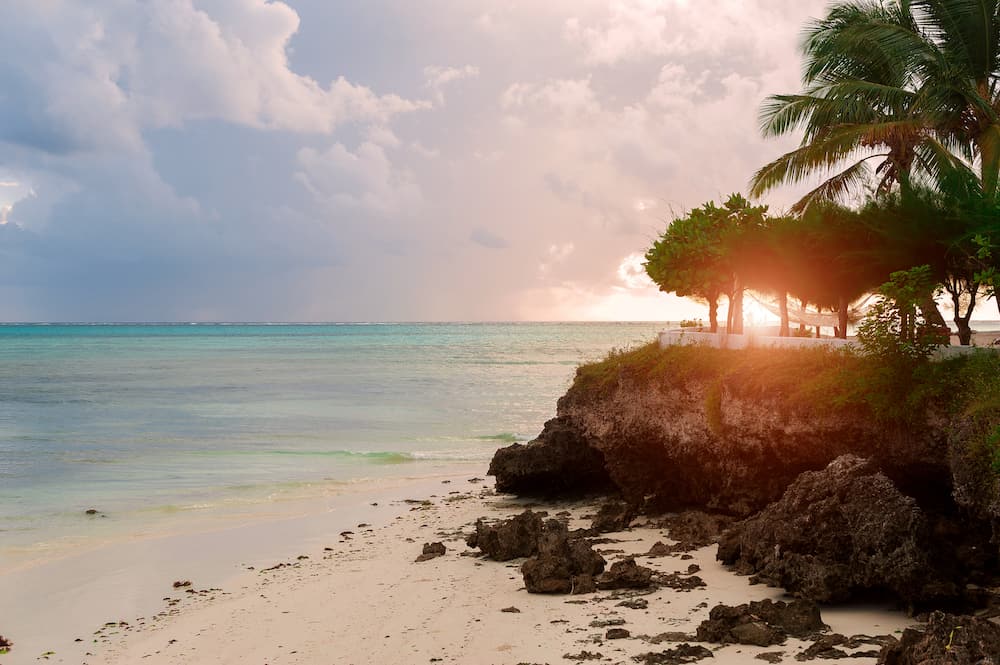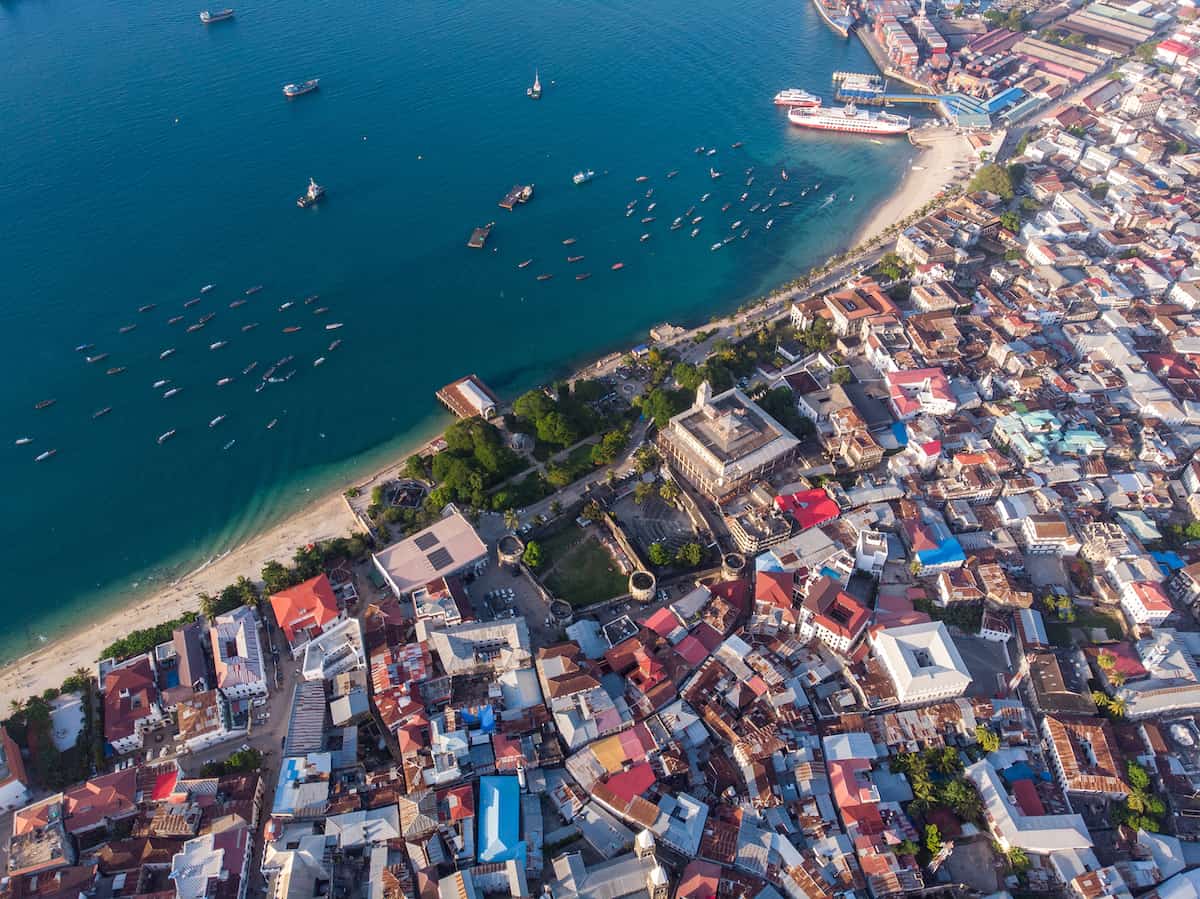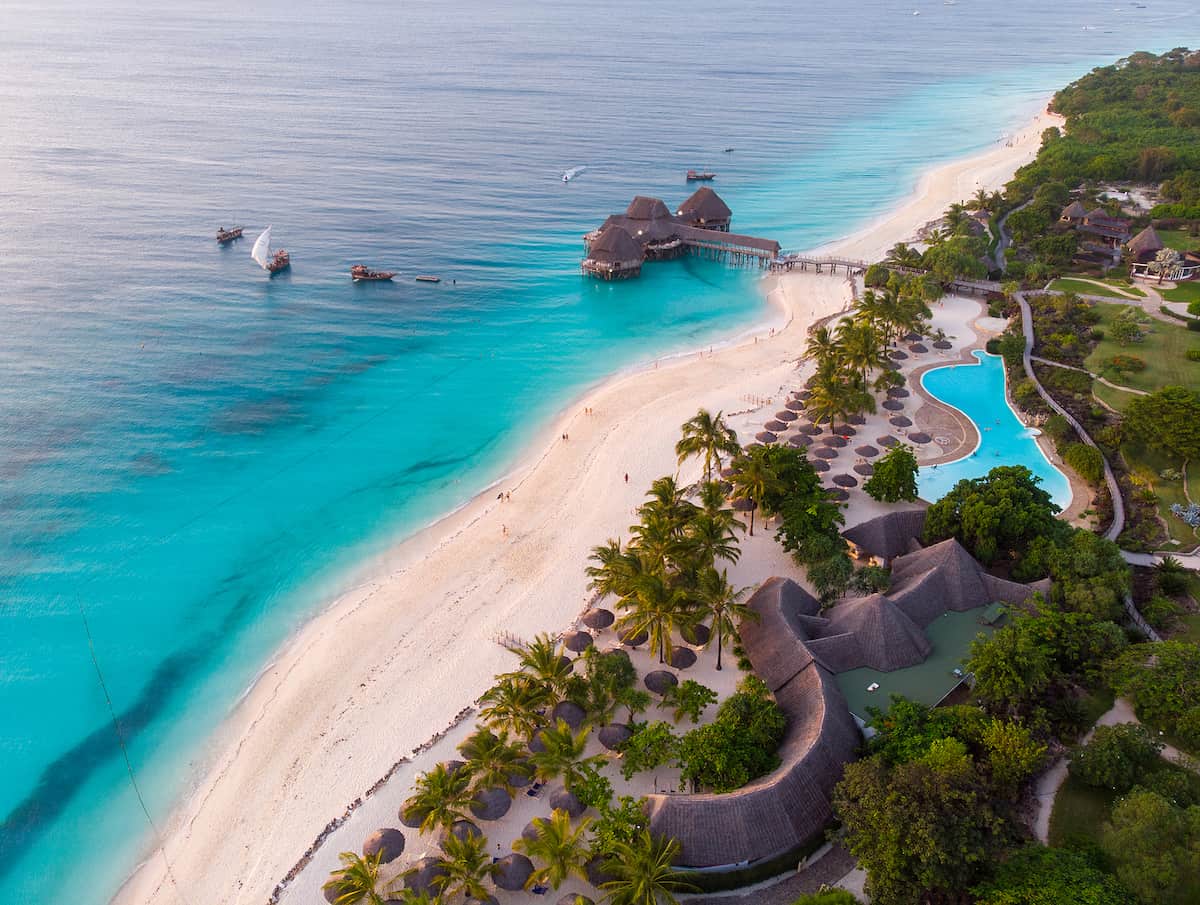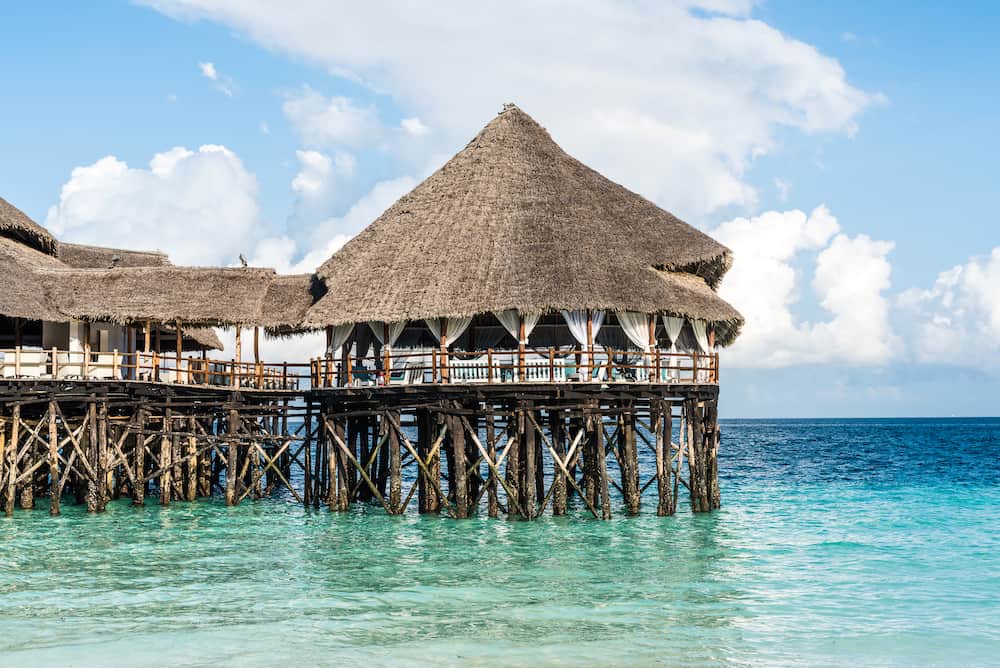is Zanzibar a good place to live?
Located off the coast of East Africa sits an idyllic island filled with history, culture and beautiful, pristine white beaches that stretch for most of the island’s coastline. Zanzibar is an attractive place, alluring all sorts of people worldwide for its natural beauty and African culture.
Many have asked, ‘Is Zanzibar a good place to live in?’ This article will give you the full breakdown and whether it suits your lifestyle preference.
Zanzibar Island, a captivating and culturally rich archipelago area, is a country off Tanzania and consists of two main islands, Unguja (commonly referred to as Zanzibar Island) and Pemba Island, along with several smaller islets in between.
The main town of Zanzibar is called Stone Town, a labyrinth of small streets and impressive wooden doors.
It has been labelled a UNESCO World Heritage Site known for its unique architecture, cultural richness, and historical significance. It has a complex and layered history that reflects its role as a hub for trade, cultural exchange, and colonialism.

The area has been inhabited since ancient times, with trade connections to the Middle East, India, and East Africa. Stone Town’s distinctive architecture and layout were shaped by Omani Arab rulers, making Zanzibar an essential centre for the Indian Ocean spice and slave trade.
Many buildings in Stone Town have connections to this dark period in history. The British abolished the slave trade and maintained their influence until Zanzibar gained independence in 1963. Stone Town’s architecture uniquely blends Swahili, Arab, Persian, Indian, and European influences.
Along the picture-perfect coastline, you will find resorts and developing villages catering to tourists, expats and digital nomads. Tourists are a constant in Zanzibar, and the island relies heavily on their tourist seasons. Still, as of late, more people are choosing the expat life and have decided to move to Zanzi for many reasons.
Not only does it have its famous turquoise water, but the relaxed and slow-paced lifestyle appeals to those looking for a break from the hustle and bustle of city life. Its growing tourism industry has created opportunities for individuals to start businesses, work remotely, or find employment in various sectors.
The tight-knit community on the island can provide a strong sense of belonging and connection. Residents often form close relationships with both locals and fellow expatriates.
Visiting or moving to Zanzibar are two different things; deciding to live there is a beautiful decision. Even though there are many pros, being aware of the cons is a smart move and could influence your final choice.
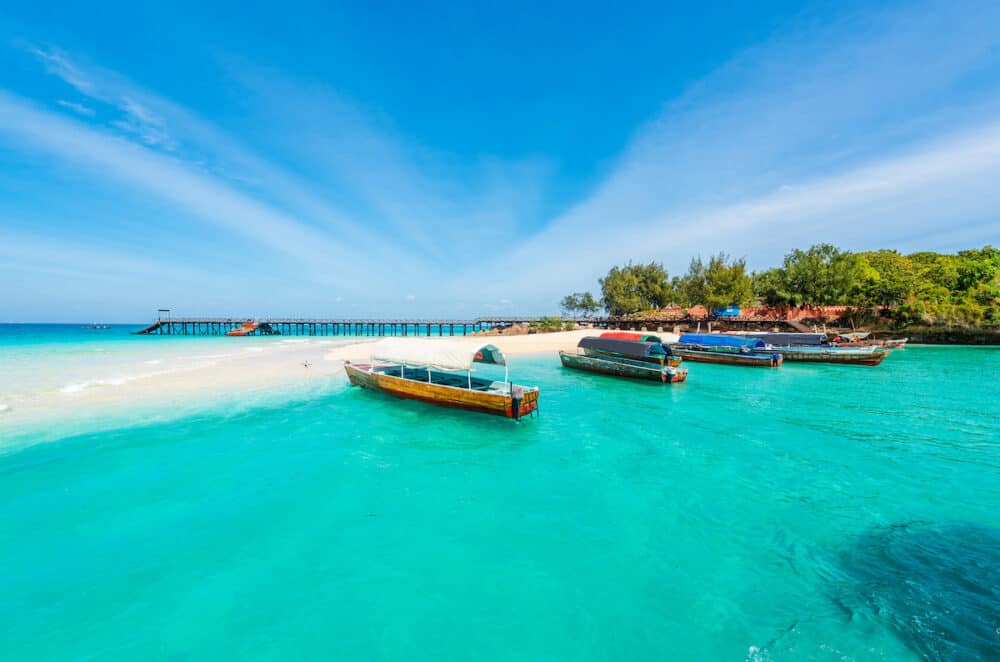
For some, the slow-paced lifestyle is impressive, while for others, it is too slow. People love the island life, whereas others may get fed up with unmaintained roads and dishevelled buildings. You may love the island’s culture, but eventually, it may become too much.
Living there comes with challenges like infrastructure limitations, cultural adjustments, and economic considerations. It is all up to you and what you’re prepared to put up with to live your life on a tropical island.
Below, I have put together information to help you decide. I have lived in Zanzibar for a year, working as a divemaster and yoga instructor, falling in love with every little thing it had to offer.
Out of all the places I have been, it is one of my favourites, and I recommend it to anyone choosing to follow the same path. There were many obstacles I had to overcome. Still, the challenges made me appreciate it even more, and whether you feel they make a difference is entirely up to you.
Plan your trip
Save on fees abroad with the Wise Card—use it at ATMs, restaurants, and for flights or hotels in over 150 countries. Manage 40+ currencies in real-time with the Wise app.
Need Help Planning?
- Cheap Flights: Find the best deals.
- Accommodation: From hostels to luxury stays.
- Car Rental: Affordable options worldwide.
- Sightseeing Tours: Explore without breaking the bank.
- Travel Adapter: One adapter for all your needs.
- Travel Insurance: Don’t risk it—stay covered.
This post includes affiliate links. Read my full disclosure and content policy.
Island Life
The first question you probably ask is, ‘Is Zanzibar nice to live in?’
It is a beautiful hidden corner of this planet, with much to offer for such a small area. Suppose you are into water activities or intend to build anything in hospitality. In that case, Zanzibar is a great place to do that.
If you are a remote worker looking for a picturesque place to stay, you have come to the right place. If you expect a fast and efficient lifestyle, I wouldn’t recommend it.
Below is a breakdown of the pros and cons of island life in Zanzibar:
Pros:
- The Natural Beauty – Zanzibar’s beaches, clear waters, and green landscapes provide the perfect environment for relaxation and outdoor activities.
- Cultural Diversity – The blend of African, Arab, Indian, and European cultures creates a diverse and vibrant community, offering a unique cultural experience.
- The Relaxed Lifestyle – The laid-back pace of life allows residents to escape the stresses of city living and enjoy a more leisurely and balanced lifestyle.
- The Historical Charm – Living in Stone Town or other historic areas allows residents to be surrounded by centuries-old architecture and immerse themselves in the island’s rich history.
- The Water Activities – Zanzibar’s waters offer a range of activities, such as snorkelling, diving, kayaking, and sailing, providing plenty of opportunities for outdoor adventure.
- Community Connections – The close-knit community can provide a strong sense of belonging and camaraderie, providing lasting friendships with both locals and fellow expatriates.
- The Culinary Delights – Zanzibar’s cuisine is a fusion of flavours from various cultures, offering residents a diverse and flavorful dining experience.
- Wellness Opportunities – The serene environment and availability of wellness activities like yoga retreats and spa treatments contribute to a balanced and health-conscious lifestyle.
Cons:
- The Limited Infrastructure – Zanzibar’s infrastructure is less developed than in more urbanized areas, leading to challenges regarding reliable utilities, transportation, and internet access.
- Healthcare – While healthcare services are available, the quality and accessibility may not match what is available in more developed regions.
- Cultural Adjustment – Adapting to a different cultural and social environment, including different customs, norms, and ways of life, can be challenging for some individuals.
- Economic Considerations – While the cost of living may be lower than in some Western countries, employment opportunities and income potential may also be more limited.
- Isolation: Being on an island can sometimes lead to feelings of isolation, particularly for individuals accustomed to larger cities’ conveniences and social interactions.
- Tourism Impact: Zanzibar’s tourism-focused economy can lead to seasonal fluctuations in job opportunities, services, and social dynamics.
- Language Barrier: While English is widely spoken, Swahili is the dominant language, and learning the local language may be necessary for effective communication.
- Environmental Challenges: Some areas of the island face ecological concerns, including waste management and conservation efforts.
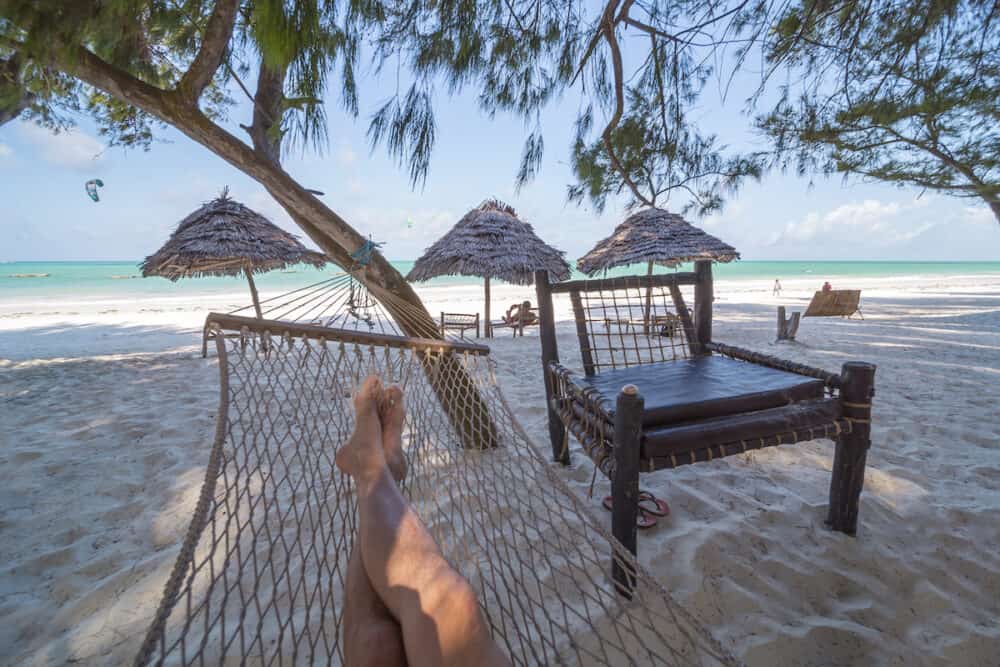
The Cost of Living
Is Zanzibar expensive? No, it is affordable if you stick to cost-effective decisions like choosing mediocre accommodations and shopping at local markets compared to actual stores.
The cost of living in Zanzibar can be attractive to many individuals. Still, it also comes with its own set of advantages and challenges.
The local currency is the Tanzanian shilling, but most places accept US dollars. Many people prefer shillings for small markets and stores, whereas US dollars would be used in restaurants, lodges and tours.
Below is a breakdown of the pros and cons of what the cost of living is like in Zanzibar:
Pros:
- Affordability – Compared to other popular destinations in the Western world, especially in Africa, the overall cost of living in Zanzibar is generally lower, making it a popular destination for individuals on smaller budgets.
- Accommodations – Apartments, guesthouses, beachfront villas and other rental accommodation options are often more affordable than in developed countries.
- Food and Dining – Local markets and eateries offer budget-friendly options for groceries and meals, including fresh produce and local cuisine.
- Getting Around – Public transportation, such as dala-dala’s (minivans) and local buses, is inexpensive, providing cost-effective options for getting around the island.
- Utilities – Depending on where you’ve chosen accommodation, essential utilities like electricity, water, and internet can be very affordable.
- Outdoor Activities – Many outdoor activities, such as swimming, snorkelling, and beach relaxation, are low-cost or even free, allowing residents to enjoy the island’s natural beauty without a broken bank.
- Healthcare – While healthcare costs vary, medical services in Zanzibar may be more affordable than healthcare systems in more well-known countries.
Cons:
- Limited Services and Amenities – The lower cost of living can sometimes reflect limited services and amenities like healthcare facilities, shopping options, and entertainment venues.
- Quality of Goods – Due to import taxes and shipping costs, imported goods and luxury items may be more expensive.
- Income Opportunities – While living costs may be lower, income opportunities and earning potential can be minimal, particularly in fields that rely heavily on tourism.
- Infrastructure Challenges – Basic infrastructure may not be as developed or consistent as in more urbanized areas, which include reliable utilities and internet access.
- Seasonal Fluctuations – Zanzibar’s economy relies heavily on tourism, which can lead to seasonal fluctuations in job opportunities, services, and prices.
- Language Barrier – While English is widely spoken, adapting to local customs and communicating effectively in Swahili may be necessary for everyday interactions.
- Reliability – Some services and businesses may operate on a relaxed schedule, and waiting around or misinformation could impact the reliability of services and transactions.
- Economic Diversity – The local economy heavily depends on tourism and fishing, which could limit the diversity of job opportunities.
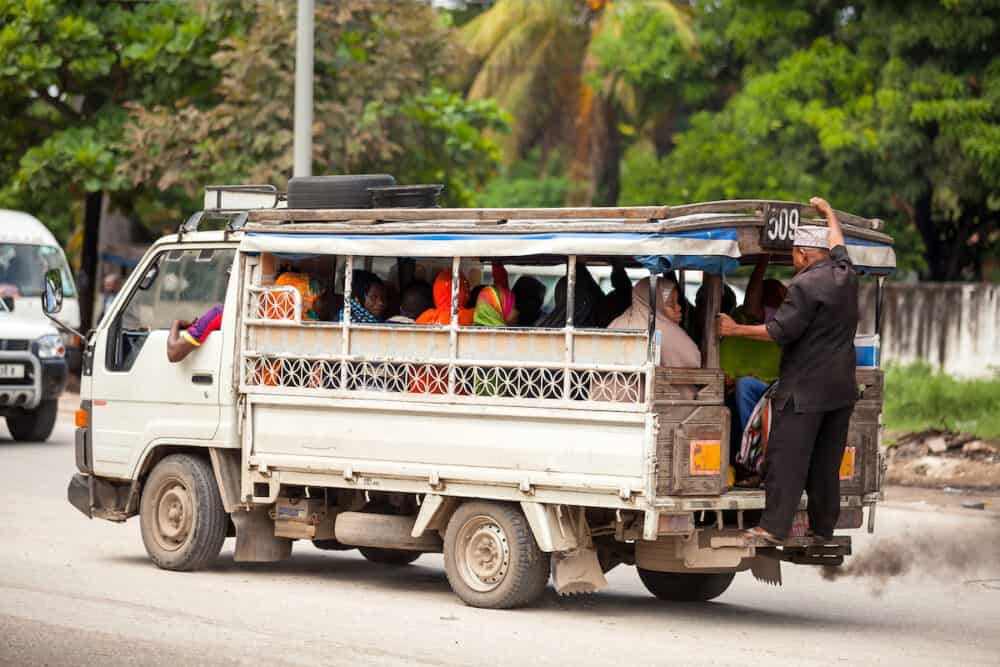
Security
Many questions in the past have asked, ‘Is Zanzibar safe?’ or even ‘Is Zanzibar safe for Americans?’ Yes, Zanzibar is safe for everyone, but don’t be surprised if you hear about petty crime and theft, especially during high seasons or holidays.
Keep an eye on valuables, listen to your intuition, stay informed and respect the culture. Drawing attention to yourself can attract the wrong crowd and put you in situations you may regret.
‘Is Zanzibar a safe place to live overall?’ Yes, I always found it safe, especially with the close and loving community that made me feel protected and comfortable wherever I went.
Below is a breakdown of the pros and cons of what the security is like in Zanzibar:
Pros:
- A Peaceful Island – Zanzibar is known for its relatively peaceful environment and low crime rates compared to other urban areas. Violent crime is rare, and the local population is usually friendly and welcoming.
- Strong Community Bonds – The close-knit community on the island can foster a sense of security, as people often look out for one another.
- Use Common Safety Measures – The tourism industry is vital to Zanzibar’s economy, and the local government measures the safety of tourists and residents in popular areas.
- Police Presence – There is a visible police presence in tourist areas and critical locations.
- Cultural Respect – The local culture often values hospitality and respect for guests, which adds to a welcoming and safe environment for residents.
Cons:
- Petty Crime – While violent crime is rare, petty crimes like pickpocketing and theft can occur, especially in crowded tourist areas.
- Seasonal times – During peak tourist seasons, there might be an increase in tourist-focused petty crime, so everyone should remain vigilant.
- Health and Safety System: The healthcare infrastructure may not be as advanced as in more developed regions, which can be a concern in medical emergencies.
- Natural Hazards – Zanzibar is prone to natural hazards such as tropical storms and cyclones, which can disrupt daily life and pose risks.
- Emergency Services – Infrastructure limitations might affect the availability and quality of emergency services.
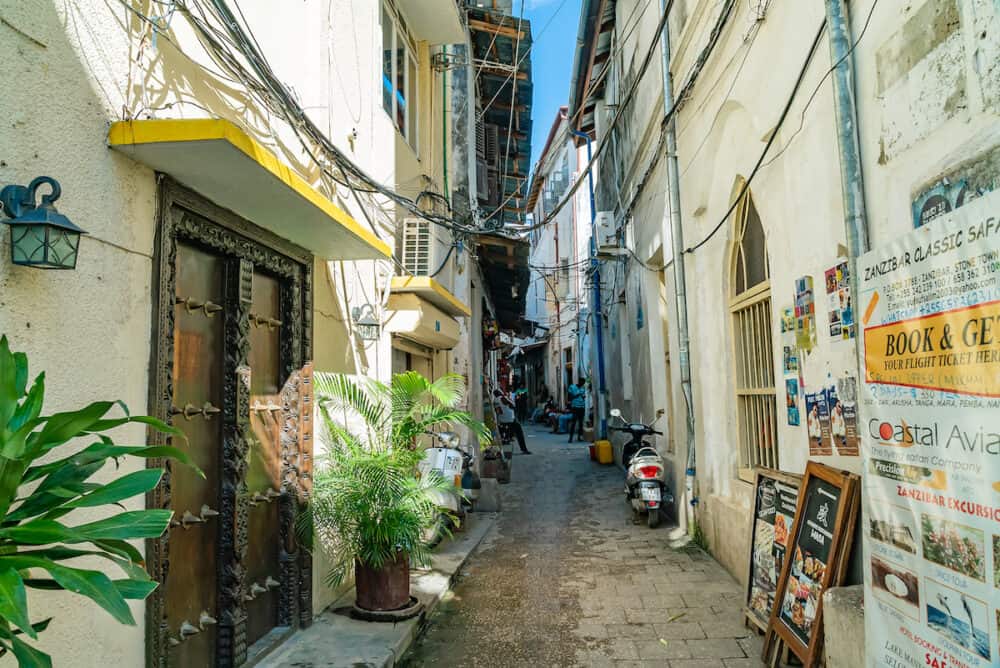
The Local Community
Living in Zanzibar is not just an excellent experience of beautiful scenery and being surrounded by a different culture; much of its charm is comprised of the whole community.
Which includes both expats and locals; they all play a significant role in shaping the experience of living there.
A common question is, ‘Do they speak English in Zanzibar?’ Yes, they do.
The official language used is Swahili, but surprisingly, many Tour Agents, hospitality workers, watersport centres and the proud ‘beach boys’ all speak English very well and can most likely speak a couple of other languages like German, French, Italian and Spanish.
Below is a breakdown of the pros and cons of what the local community is like in Zanzibar:
Pros:
- Expect Warm Hospitality – Zanzibari people are known for their kind and friendly nature. The local community often welcomes people with open arms, especially those deciding to stay.
- Cultural Exchange – Interacting with the local community allows you to immerse yourself in Zanzibar’s diverse cultures and traditions, where you can learn about Swahili customs, celebrations, and ways of life.
- Strong Social Bonds – The close-knit nature of the local community can lead to strong social connections and provide you with a robust support system.
- Enjoy Authentic Experiences – Engaging with locals can offer genuine experiences beyond tourist attractions. You can participate in local festivals, markets, and daily routines.
- Learning the Language: Interacting with the local community can help you learn Swahili, enhancing your understanding of the culture and improving daily communication.
Cons:
- A Cultural Adjustment – Adapting to a new cultural environment can be challenging, and misunderstandings might arise due to cultural differences in communication, norms, and social behaviours.
- The Language Barrier – While English is widely spoken, effective communication and more profound connections require learning Swahili.
- Different Expectations – Expectations around social interactions and norms might differ from what you’re accustomed to, leading to occasional misunderstandings or discomfort.
- Understanding the Societal Norms – Zanzibar has its own societal norms and customs; understanding these can be important for building positive relationships within the community.
- Integration – Fully integrating into the local community may take time, effort, and patience, particularly if you’re from a different cultural background.

The Weather
In places like Zanzibar, you will generally be on picturesque beaches, walking in lush jungles under a scorching sun. However, like any tropical paradise, be prepared for tropical storms. I have always found these situations and experiences really interesting.
Watching mini tornados suck up the ocean’s surface just off the island’s coastline was scary, eye-opening and beautiful all at the same time. It lets you encompass the energy you feel when the weather prepares to let loose.
Below is a breakdown of the pros and cons of what the weather is like in Zanzibar and which time of the year may better suit your arrival:
Pros:
- Tropical Climate: Zanzibar enjoys a tropical climate, which means warm temperatures throughout the year, making it an ideal destination for those who prefer a more hospitable environment.
- Sunshine and Beaches: The sunny weather and consistent temperatures make Zanzibar a paradise for beach lovers. You’ll have ample opportunities to enjoy the beautiful beaches and turquoise waters.
- Outdoor Activities: The pleasant climate allows various outdoor activities, from swimming and snorkelling to hiking and exploring the island’s natural beauty.
- Consistent Seasons: Zanzibar has two distinct seasons: the dry season (June to October) and the wet season (November to May). This consistency can help with planning outdoor activities and events.
- Tropical Vibes: The warm and humid weather creates a tropical atmosphere, which many people find appealing for its relaxation and laid-back lifestyle.
Cons:
- Rainy Season Challenges: The wet season, especially from March to May, can bring heavy rainfall and increased humidity. This can lead to flooding in some areas and potential disruptions to daily life.
- Humidity: Zanzibar’s tropical climate means higher humidity levels, which might take some time to acclimate to, especially for those not used to humid conditions.
- Cyclones: The region is prone to tropical cyclones during the rainy season, which can lead to strong winds, heavy rainfall, and potential damage to infrastructure.
- Seasonal Fluctuations: Tourist services and activities might be reduced during the rainy season, and some areas might experience a decrease in overall amenities.
- Health Considerations: High humidity can increase mosquito activity, so residents must take precautions against mosquito-borne illnesses.
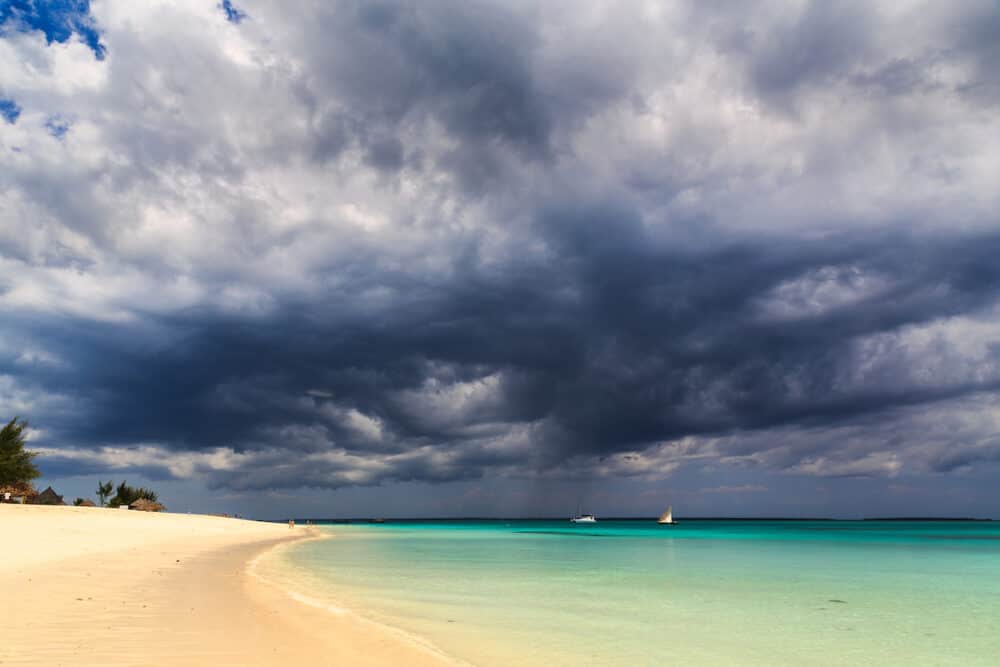
Shopping in Zanzibar
Shopping in Zanzibar is very different from your typical shopping in Western Countries. You won’t find shopping malls or well-put-together stores.
Still, you will find beautiful markets throughout Stone Town and the popular coastal areas around the island. Treasure troves of African items, filled with colours, metals and wooden art pieces.
Markets like Darajani Market offer a glimpse into daily life, with stalls selling spices, fresh produce, crafts, and more.
Below is a breakdown of the pros and cons of the type of shopping to expect in Zanzibar:
Pros:
- Local Handicrafts – Zanzibar is known for its vibrant local crafts and handmade products, including wood carvings, textiles, jewellery, spices, and more.
- Fresh Produce – Local markets offer a variety of fresh produce, spices, and seafood, allowing you to enjoy a wide range of flavorful and locally sourced ingredients.
- Affordability – Many goods, especially local products, can be more affordable than prices in more developed countries.
- Authenticity – Shopping in local markets and stores allows you to support local businesses and craftsmen, contributing to the island’s economy and cultural preservation.
- Cultural Experience – It can be a cultural experience, allowing you to interact with local vendors, learn about traditional products, and bargain.
Cons:
- Limited Variety – While you can find unique local products, the variety of goods might be limited compared to larger urban centres, and you might need to adjust your shopping preferences accordingly.
- Imported Goods – Imported goods, especially luxury items, might be more expensive due to import taxes and shipping costs, impacting the availability and affordability of certain products.
- Quality Assurance – Quality control might be a concern for specific products.
- Availability Fluctuations – Some goods might not be consistently available due to seasonal variations, supply chain challenges, and local production capacities.
- Limited Hours – Certain shops and markets may have limited operating hours, especially during holidays and festivals.
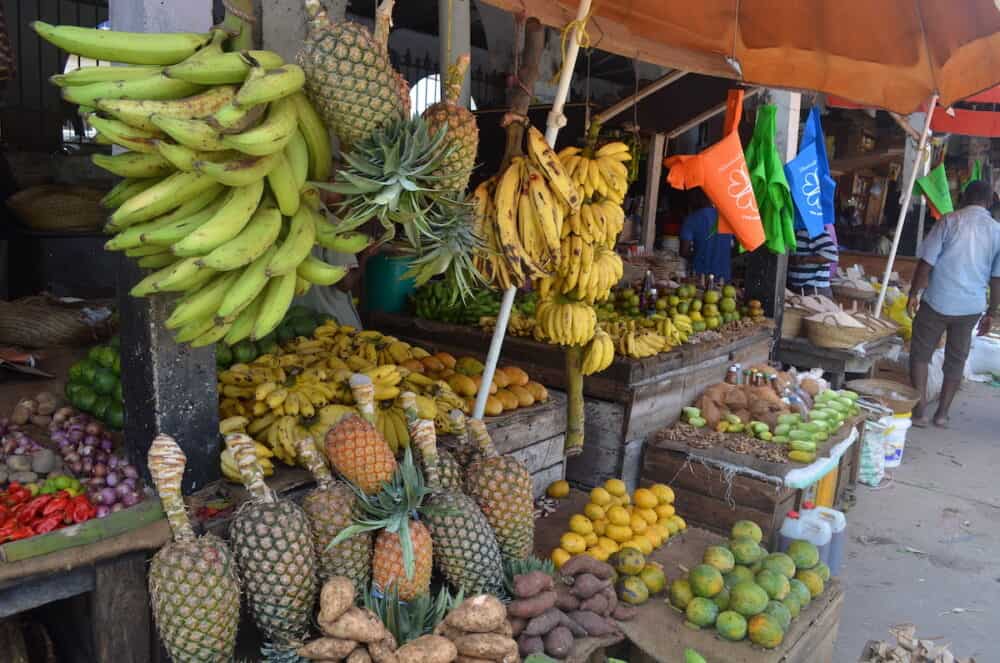
Accommodation
Deciding where to live in Zanzibar depends on your preference and budget. You will find many options, from luxury hotels and resorts to backpackers, guesthouses and villas.
All range from different prices depending on their location and the length of time you plan to stay since some offer long and short-term rentals.
Many expats in the area choose to live in compounds, a group of buildings in an enclosure usually owned by a family.
Below is a breakdown of the pros and cons regarding accommodation in Zanzibar:
Pros:
- Scenic Locations – Many accommodations in Zanzibar offer stunning ocean views, beaches, or lush landscapes, contributing to a charming and tranquil living environment.
- Beachfront Living – You can find a range of beachfront properties, from budget-friendly options to luxurious villas, allowing easy access to the beach and waterfront activities.
- Cultural Immersion – Living in Stone Town or local villages immerses you in Zanzibar’s rich history, architecture, and daily life, fostering a deeper connection with the local community.
- Privacy and Tranquility – Remote areas of the island offer peace and solitude, allowing residents to enjoy a quiet and serene living environment away from the bustling tourist areas.
- Rental Options – Zanzibar offers a variety of rental options, from apartments and guesthouses to private villas and compounds, all offering different prices.
Cons:
- Infrastructure – Certain areas have limitations regarding utilities, reliable internet, and other essential services, which could impact your daily living experience.
- Property Maintenance – Maintaining properties, especially in humid and coastal environments, might require regular upkeep and attention to prevent wear and tear.
- Seasonal Fluctuations – Depending on the area, rental availability and prices might fluctuate based on tourist seasons, which could impact long-term arrangements.
- Accessibility – Some remote or less developed areas might have limited accessibility and transportation options, posing possible challenges for daily commutes and errands.
- Property Security – Depending on the location, security features might be limited, and residents might need to take additional precautions to secure their belongings.
- Cultural Adjustment – Living in more traditional areas might require adjusting to local customs, norms, and social dynamics.
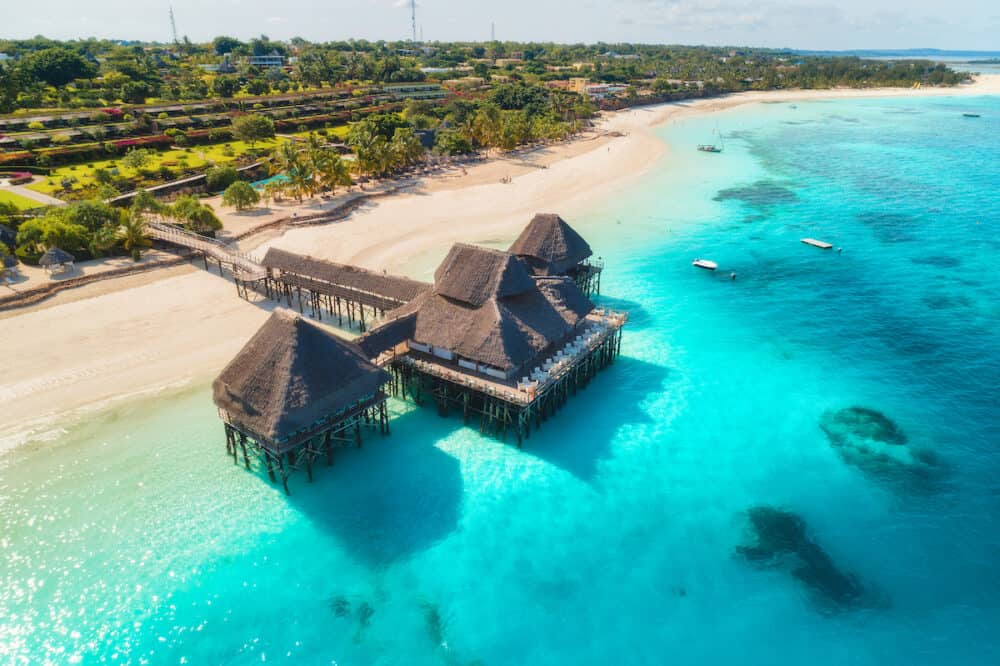
Transport
Transportation on Zanzibar Island varies depending on your budget. Many of the expats who have been on the island for a long time drive 4x4s, whereas some of the newer and younger expats are happy with motorbikes and scooters.
Many don’t even own cars or other forms of transport since Zanzibar is such a walkable place, primarily via the beaches in popular areas.
Most people, like everyday travellers, use local forms of transportation like a dala-dala, a public minibus, or a tuk-tuk, a 3-wheel scooter with an inbuilt setting section. These are the cheaper forms of transport and the most commonly used.
Below is a breakdown of the pros and cons of the different transportation options used in Zanzibar:
Pros:
- Affordability – Public transportation options, such as dala-dalas and local buses, are generally affordable.
- Local Experience – Using local transportation allows you to interact with residents, experience daily life, and immerse yourself in the local culture.
- Accessibility – Public transportation can take you to various parts of the island. These remote or less developed areas might not be easily accessible by private vehicles.
- Environmentally Friendly – Public transportation can help reduce your carbon footprint and contribute to more sustainable living.
Cons:
- Limited Schedules – Public transportation might only sometimes run on fixed schedules.
- Crowded Conditions – Public transportation, especially dala-dalas, can be packed and uncomfortable during peak hours.
- Safety Concerns – Some public transportation vehicles might need to meet the safety standards you’re accustomed to.
- Infrastructure Challenges – Roads and transportation infrastructure in some areas might need to be developed, potentially affecting travel comfort and times.
- Reliability – Public transportation might be less reliable during certain times or seasons, affecting your ability to reach your destination on time.

Activities
It is filled to the brim with various activities inland and ocean-based, attracting people worldwide for its history, culture and epic diving.
Whether wandering the streets of Stone Town or diving with sea turtles and reef sharks, Zanzibar offers many opportunities with a mixture and flare of culture and island-orientated things to do.
On one side of the island, you can dive, snorkelling, fishing and watersports. On the other side of the island is surfing, windsurfing and kite surfing, with available tours for seaweed-based products and famous spices.
Below is a breakdown of the pros and cons regarding the diverse activities you can find in Zanzibar:
Pros:
- Beach and Water Activities – Zanzibar offers many beach and water activities, including swimming, snorkelling, diving, sailing, and kiteboarding. The island’s stunning beaches and clear waters provide endless opportunities for outdoor fun.
- Cultural Exploration – From exploring Stone Town’s historic streets to visiting local markets and cultural sites, Zanzibar provides ample opportunities to immerse yourself in its rich history and African culture.
- Wellness and Relaxation – Zanzibar is a popular destination for wellness retreats, offering yoga, meditation, and spa experiences in a peaceful and natural environment.
- Outdoor Adventures – Beyond the beaches, you can enjoy hiking, exploring forests, and taking guided tours to observe local wildlife.
- The Food – Zanzibar’s cuisine is a fusion of flavours from different cultures where you can indulge in local dishes and exotic spices.
Cons:
- Seasonal Fluctuations – Some activities might be seasonal, especially those related to water sports.
- Tourism Impact – Popular tourist spots might become crowded during peak seasons, affecting your experience of certain activities.
- Costs – Engaging in certain activities, especially those catering to tourists, might come with higher costs than you’re accustomed to.
- Language Barrier – For activities that involve interacting with locals, a language barrier may limit your understanding and communication.
- Safety Concerns – When engaging in outdoor activities, such as water sports or hiking, it’s essential to consider safety precautions and follow guidelines to avoid accidents or injuries.
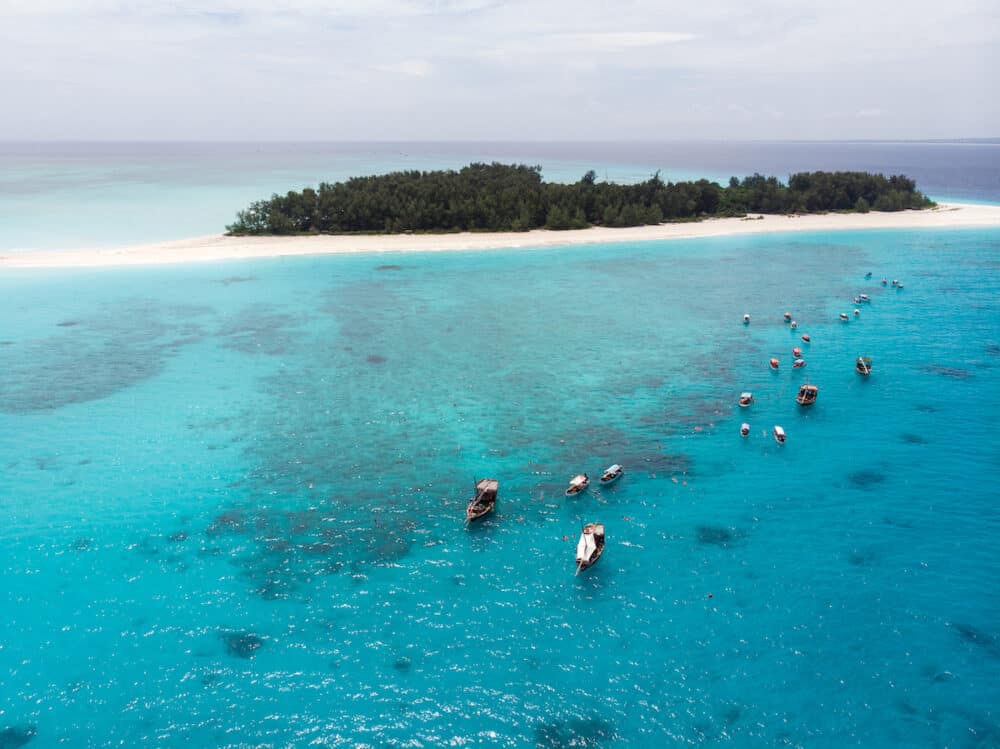
FAQs About living in zanzibar
Below are a couple of questions commonly asked regarding Zanzibar and whether you intend to travel or move there:
Is Zanzibar a good place to visit?
Yes, Zanzibar is a lovely and affordable destination with many opportunities for activities and relaxation.
Can I retire in Zanzibar?
Yes, Zanzibar has an adequate pension scheme known as the ZSSF, and the possibility of buying property attracts many people yearly.
Why choose Zanzibar?
Zanzibar ticks many boxes and offers a very tranquil way of life. It is not a very developed country, but its high energy, supportive community, fantastic cuisine, colourful history, and deep African culture provide an exciting and fabulous lifestyle that many other places only sometimes offer.
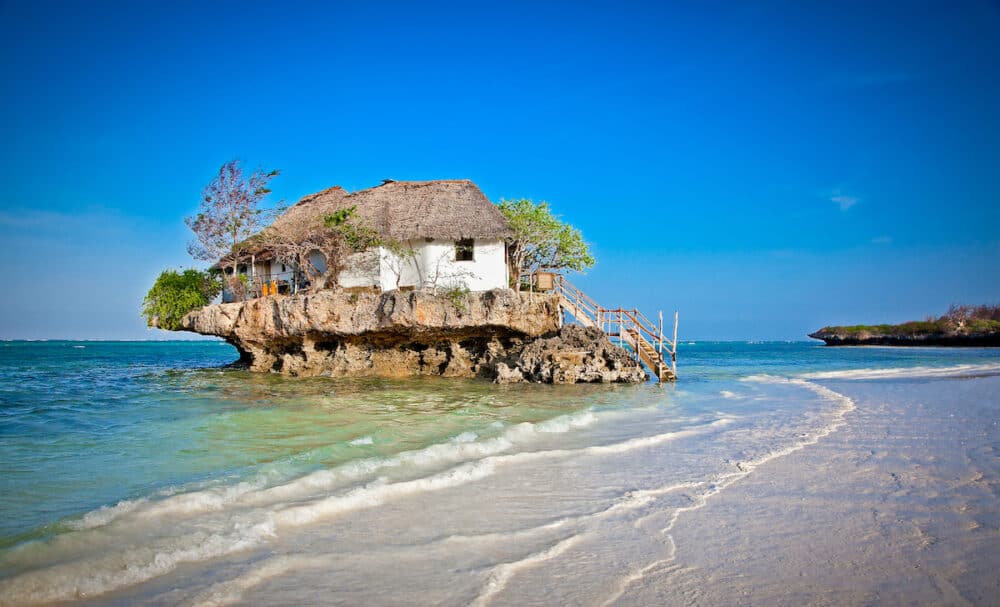
Final Thoughts: is zanzibar a good place to live
Are you someone who appreciates the outdoors? Are you a remote worker who enjoys the ocean? Or you’re looking for a place to retire. Zanzibar is out of the way and perfectly represents a tropical paradise.
You will be surrounded by culture, from the Massai herding their cows along the beaches to the coral-coloured streets of Stone Town, providing stories of its impactful history.
Making your decision depends entirely on how adaptive you think you can be moving to a destination so different from the Western world.
It is also up to your personal preferences and whether you feel the island has everything necessary to live the life you want. I recommend visiting first before making any big decisions to move.



